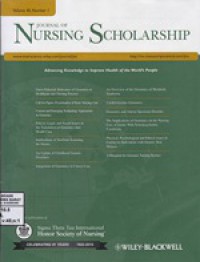
Jurnal
Basic Nursing Care to Prevent Nonventilator Hospital-Acquired Pneumonia
Purpose: Nonventilator hospital-acquired pneumonia (NV-HAP) is an underreported and unstudied disease, with potential for measurable outcomes, fiscal savings, and improvement in quality of life. The purpose of our study was to (a) identify the incidence of NV-HAP in a convenience sample of U.S. hospitals and (b) determine the effectiveness of reliably delivered basic oral nursing care in reducing NV-HAP.
Design: A descriptive, quasi-experimental study using retrospective comparative outcomes to determine (a) the incidence of NV-HAP and (b) the effectiveness of enhanced basic oral nursing care versus usual care to prevent NV-HAP after introduction of a basic oral nursing care initiative.
Methods: We used the International Statistical Classification of Diseases and Related Problems (ICD-9) codes for pneumonia not present on admission and verified NV-HAP diagnosis using the U.S. Centers for Disease Control and Prevention diagnostic criteria. We completed an evidence-based gap analysis and designed a site-specific oral care initiative designed to reduce NV-HAP. The intervention process was guided by the Influencer ModelTM (see Figure 2) and participatory action research.
Findings: We found a substantial amount of unreported NV-HAP. After we initiated our oral care protocols, the rate of NV-HAP per 100 patient days decreased from 0.49 to 0.3 (38.8%). The overall number of cases of NV-HAP was reduced by 37% during the 12-month intervention period. The avoidance of NV-HAP cases resulted in an estimated 8 lives saved, $1.72 million cost avoided, and 500 extra hospital days averted. The extra cost for therapeutic oral care equipment was $117,600 during the 12-month intervention period. Cost savings resulting from avoided NV-HAP was $1.72 million. Return on investment for the organization was $1.6 million in avoided costs.
Conclusions: NV-HAP should be elevated to the same level of concern, attention, and effort as prevention of ventilator-associated pneumonia in hospitals.
Clinical Relevance: Nursing needs to lead the way in the design and implementation of policies that allow for adequate time, proper oral care supplies, ease of access to supplies, clear procedures, and outcome monitoring ensuring that patients are protected from NV-HAP.
Availability
No copy data
Detail Information
- Series Title
-
Journal of Nursing Scholarship, Volume 46, Number 1 January 2014
- Call Number
-
(05) 610.5 WIL j
- Publisher
- Malden : Wiley-Blackwell., 2014
- Collation
-
Hlm. 11-19
- Language
-
English
- ISBN/ISSN
-
1527-6546
- Classification
-
(05) 610.5 WIL j
- Content Type
-
-
- Media Type
-
-
- Carrier Type
-
-
- Edition
-
Volume 46, Number 1
- Subject(s)
- Specific Detail Info
-
-
- Statement of Responsibility
-
-
Other version/related
No other version available
File Attachment
Comments
You must be logged in to post a comment
 Computer Science, Information & General Works
Computer Science, Information & General Works  Philosophy & Psychology
Philosophy & Psychology  Religion
Religion  Social Sciences
Social Sciences  Language
Language  Pure Science
Pure Science  Applied Sciences
Applied Sciences  Art & Recreation
Art & Recreation  Literature
Literature  History & Geography
History & Geography